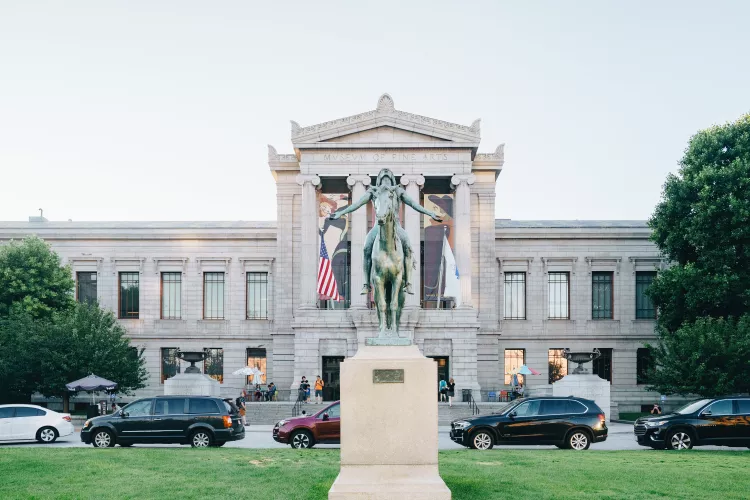Summary
The Museum of Fine Arts, Boston, unveiled its Art of the Americas Wing on November 20, 2010. This four-story, 121,307-square-foot addition—the centerpiece of the museum’s $345 million expansion—features 53 distinct galleries and period rooms. From prehistoric Native American artifacts to 20th-century art, the Art of the Americas Wing narrates the evolution of American creativity.
Housing over 5,000 works, which is double the American art displayed previously, it offers sufficient material for an extensive visit, captivating anyone interested in the breadth of American art.
Here are 10 remarkable masterpieces visitors to the MFA’s Art of the Americas Wing should not miss.
01 of 10: A Colossal Masterpiece
:max_bytes(150000):strip_icc():format(webp)/1819_Passage_Of_The_Delaware_byThomasSully_MFABoston-5b0c6e553418c600386b1247.jpeg)
Philadelphia artist Thomas Sully’s 1819 Passage of the Delaware stretches 146.5 x 207 inches—over 17 feet wide! This significant Revolutionary War moment from Christmas night 1776 was commissioned for the State House in North Carolina but never displayed there due to its dimensions. Instead, it found a home at the Museum of Fine Arts, Boston in 1903, where it was stored for over a century until the wing was built with a wall to support its size and weight.
02 of 10: Sons of Liberty Bowl

Paul Revere’s Sons of Liberty Bowl isn’t just a piece of silver; it’s a symbol of political defiance. Inscribed bowls by Revere’s fellow Sons of Liberty celebrate the 92 members of the Massachusetts House of Representatives who resisted the Townshend Acts, sparking the American Revolution.
03 of 10: A John Singer Sargent Painting Springs to Life

Among the substantial holdings of John Singer Sargent, his 1882 portrait The Daughters of Edward Darley Boit, painted when he was just 26, stands out in the Art of the Americas Wing. The accompanied 19th-century porcelain vases complement the painting, bringing it to life in a three-dimensional display.
04 of 10: Mighty Niagara

At the second level dedicated to 19th Century Americans Abroad, visitors will find William Morris Hunt’s 1876 Niagara, which draws attention among the depictions of the iconic falls.
05 of 10: A Frame That’s Stood the Test of Time

The Manning House Frame, dating back to circa 1692-93, uses historical wood from Ipswich, Massachusetts, allowing visitors to appreciate the authenticity of colonial-era art and furnishings.
06 of 10: The Most Iconic American Portrait Ever Painted

Depicting George Washington, many of Gilbert Stuart’s portraits, particularly this 1796 version, have become synonymous with American history. Visitors can view Stuart’s interpretations alongside his portraits of other key figures like Martha Washington and John Adams in the Art of the Americas Wing.
07 of 10: American Craftsmanship

The Townsends and Goddards, prominent Quaker families from Rhode Island, are well-represented at the MFA, with their distinctive style of furniture illustrating the pinnacle of colonial craftsmanship.
08 of 10: A Cherished Boston Scene

In a gallery dedicated to Impressionism in Boston, Childe Hassam’s work, Boston Common at Twilight, poignantly illustrates winter in the city, showcasing his ability to depict urban life through the lens of Impressionism.
09 of 10: A Rockwellian View of the ’60s

Norman Rockwell’s 1967 painting, created for a Look magazine article, reflects the social changes of the 1960s, showing middle-class African-American families moving into predominantly white suburbs.
10 of 10: A Moving Memorial

A model of Walker Hancock’s Pennsylvania Railroad War Memorial, housed in the Art of the Americas Wing, provides a touching tribute to art’s emotional depth. The memorial portrays the Angel of the Resurrection embracing a fallen soldier, eliciting powerful responses from viewers.





